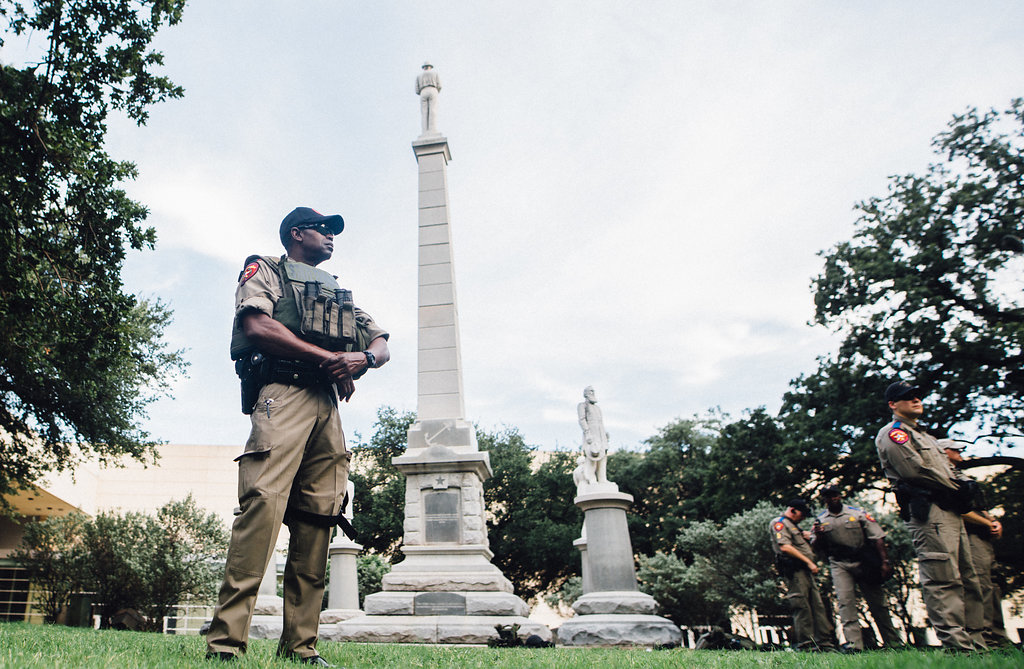As Alex wrote earlier, any substantive decision about the future of Dallas’ Confederate monuments will have to wait for another day–likely allowing for a few more parades of historical and racial ignorance like the one the council was subjected to this morning during the open mic session of their meeting.
Not that the council didn’t take any action on Dallas’ links to its Confederate history today. Council members approved section 2 of the agenda item, which provided, “that streets with names linked to the Confederacy shall not be renamed.”
That’s it. So simple. If I’m reading that language correctly, it simply means that from here on out, if there is a street with a Confederate’s name on it, it can’t be changed. Which seems odd, and quite a reversal from last October, when the mayor’s Confederate Monument Task Force recommended the city change the names of a whole bunch of streets that honored less-than-honorable figures of the city’s Confederate past.
The new policy may not hold any weight, as council member Philip Kingston was quick to point out.
“Not only is this a bad idea, it is legally meaningless,” Kingston said. “We can’t bind future councils.”
Nonetheless, the provision passed. And a new citizens group called the Commemoration Committee to Honor Roy Williams and Marvin E. Crenshaw filed a suit yesterday in Federal Court in anticipation of today’s vote, alleging that the ban on renaming streets amounts to a restriction of freedom of speech.
“If passed the resolution acts as content-based unconstitutional prior restraint on free speech,” the committee, which formed in February, said in a release. “The resolution, which is widely expected to pass, chills the Plaintiff’s political speech by disallowing any meaningful participation in the established process to rename a street. The omission of such rights is tantamount to official oppression.”
The committee says it wants to rename Marilla St. for Marvin E. Crenshaw. And if you, like me, didn’t realize that Marilla was yet another Dallas street with Confederate ties, the lawsuit fills in the historical details. Marilla St., it says, was named for the mother of Confederate Chaplain William Ceiton Young, whom it describes as a “prominent 19th and 20th century ministor and neo-Confederate in Dallas.”
Young was a minister of the Methodist Episcopal Church South, the pro-slavery branch of the Methodist church (some northern Methodists were involved in the abolitionist movement before the Civil War). During the Civil War, Young served as the Missionary Chaplain to General W. L. Cabell, who had his own Dallas elementary school named after him. Cabell, not exactly an honorable solider, led a massacre at the infamous Battle of Poison Springs in 1864:
It was so notorious that African American Union regiments had a battle cry, “Remember Poison Springs.” After the battle, the 29th Texas Calvary execution squads, led by Cabell, roamed the battlefield murdering wounded African American solders chanting “Where is the First Kansas N***** now? All cut up to pieces and gone to hell.” Some were scalped. The captured Union wagons were used in a contest to crush “n***** heads” under the wheels.
One wonders where the minster was when all this butchering was going on.
After the war, Young became very active in Dallas civic affairs. The Kentucky-born minister served as District Clerk, street commissioner, and alderman. Young built the first home in The Cedars, and he was also active in a group that helped to erect the Confederate War Memorial.
Young’s story is a reminder that much of this city’s early history was built by former Confederates. It comes as no surprise, then, that that history was also defined by gross segregation, inequality, disenfranchisement, racist policies, and racial bullying and lynching. The question remains, to what extent should we honor the ways in which these men sought to honor the ideology that underpinned the racist elements of their worldview? Should we destroy their monuments? Move them? Board them up with explanatory plaques?
The council hasn’t made up its mind. But today the council did decide that one way to honor them is to prohibit the renaming of any of their streets. If that is any indication of where this whole debate is now heading, then council member Kevin Felder’s ominous comments at today’s meeting should raise some concern:
“Be careful about all these delays,” Felder said. “There is a shadow plan in the works.”





